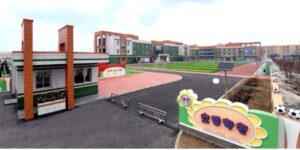Blueberry, a species Vaccinium australe of the family Ericaceae, and its processed goods are popular among the people for its various properties good for human health. Especially popular is bog bilberry in Mt Paektu, which is situated in the highest area in Korea (2 750m) and is designated as a world biosphere reserve. It occurs in the natural forests free from air pollution.
Containing protein, crude fat, pectin, flavonoid and various vitamins such as vitamin C, it is good for treating and preventing diseases of cardiovascular and circulatory systems, for promoting metabolism, for treating coughing and diarrhea, for lowering fever and neutralizing drug addiction.
Paektusan bog bilberry is more efficacious when it is eaten fresh; and if dried fruits are eaten, they have a positive effect, like lowering the level of sugar in the blood. In the city of Samjiyon adjacent to Mt Paektu, it is difficult to find people wearing glasses; even the elderly do not wear glasses. It is because bog bilberry is efficacious against aging. It is also efficacious in treating acute and chronic enterocolitis, tonsillitis and urinary tract infection, in preventing aging of the skin and in removing wrinkles.
The Democratic People’s Republic Korea widely cultivates bog bilberry and produces its processed goods. The university of agriculture and forestry in Hyesan, the seat of Ryanggyang Province, has a laboratory specializing in studying bog bilberry. In Samjiyon there are cultivated and natural bog bilberry fields covering an area of nearly 1 000 hectares. The Paektusan bog blueberry processing factory in Hyesan and the bog bilberry drinks factory in Samjiyon produce wine, jam, carbonated drink, fermented soft drinks, candy, biscuits, bread, jelly, ice cream and tea with bog bilberry. The bog bilberry wine stored in oak barrel tastes gentle and refreshing. Their products are favoured not only by the Korean people but also by the foreigners visiting the DPRK.
A Household Doctor

There are household doctors in the Democratic People’s Republic of Korea, where universal free medical care is in force.
Employed at a certain people’s hospital or polyclinic, which is in charge of public health service in a ri or dong, the lowest administrative unit of the country, they are in charge of a certain number of households. Their task is to work at their hospitals or polyclinics in the morning and make a round of visits to the households in their charge in the afternoon for hygiene information work, vaccination or regular check-up.
Rare Bird Fossils Found

Recently, fossils including those of a bird of the Mesozoic age were discovered in the area of the Paektho-dong, Sinuiju, North Phyongan Province, in the northwestern part of the Democratic People’s Republic of Korea.
The paleontological research team of Kim Il Sung University unearthed the fossils of the head and toe bones, 11 primary flight feathers and small flight feathers in the third layer of the Sinuiju formation (about 130 million years old) that belongs to a Cretaceous layer of the Mesozoic age.
Also they discovered the fossils of a dinosaur teeth, primitive mammals and fishes.
Fossils of many animals and plants had already been unearthed there; among them, there was archaeopterixarchaeopterix coreanica (approximately 150 million years old), which attracted the special attention of the world academic circles.
Are They Really Orphans?





These are students of Pyongyang Primary School for Orphans.
There are nurseries, kindergartens, primary schools and middle schools for orphans in various parts of the Democratic People’s Republic of Korea.

